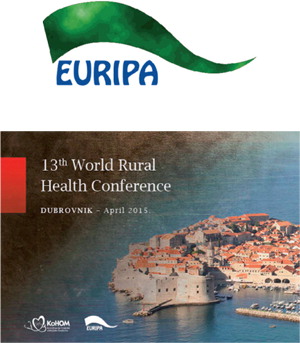
Most literature published to date in the field of rural medicine and rural health concentrates on North America, Australia, New Zealand and parts of sub-Saharan Africa. Europe is perceived to be mainly urban. However, 2006 data suggests that 56% of the population (Eurostat) of the European Union's 27 countries live in rural areas. If we were to add the population of the West Balkans, Turkey, Moldavia and the European part of Russia to this number, it would surely only increase. The European rural family is as diverse as it is large.
Rural communities have increasing numbers of elderly people as a result of longer life spans, poor rural economies and a drift of young people into the cities. The current economic crisis affecting the whole region appears to be impacting heavily on these rural communities. South East Europe remains one of the most underdeveloped parts of the continent. The challenges of under investment, poverty, poor education and crumbling infrastructure have been magnified by significant cultural, religious and racial conflict.
Whereas other parts of Europe have recognized the health and care needs of its rural communities, little has changed in this region. Access remains the overriding problem for rural communities with crumbling transport, health and social care infrastructures.
Rural practitioners are beleaguered, un-empowered and not valued. They often work alone with little access to other professionals, services, diagnostics, specialists or continuing education. Their scope of practice is restricted with limits on what they can prescribe (Romanian GPs are not able to prescribe opioids in palliative care) and who they can treat (Bulgarian GPs are not able to treat children).
The former Yugoslavia experienced a rapid and impressive expansion of general practice at the beginning of the 1960s; however, during and after the war it saw a sudden decline. Despite some improvement in certain countries, general practice and in particular rural general practice remains a sad backwater. Policy makers have ignored the pivotal role of general practice/family medicine and power remains in the large hospitals in the major cities and in the specialist dominated medical schools.
Future success in changing the status quo will depend on a more enlightened, evidence based and socially accountable health care system.
The Coordination of Croatian Family Medicine (KoHOM) is one of the most successful GP organizations in the region. It is a relatively young representative body, which has grown and gained in strength on the unrest of general practitioners over their status and knowledge. KoHOM is also represented on the Wonca Europe Council and has representatives on the boards of EURIPA, EQuiP.
KoHOM was proud to be invited (at very short notice) to host, and successfully organized, the 3rd EURIPA Rural Health Forum in May 2012. As a testimonial to the importance of the event and the cooperation between the two organizations, Croatia's Minister of Healthcare, Ranko Ostojić's, joined the meeting on the Island of Pag. He also pledged support for KoHOM's application in partnership with EURIPA to host a future Wonca World Rural Health Conference in Croatia.
In cooperation with EURIPA, KoHOM decided to apply for candidacy to host the Wonca World Rural Health Conference in 2015. KoHOM's candidacy was accepted on 8 October 2012 in Thunderbay, Canada on the day when Croatia celebrated its Independence Day.
The Conference will take place in mid April 2015 in Dubrovnik. A series of rural health themes, workshops and visits to GPs in Croatia and neighbouring countries will be organized as well as attractive pre- and post-conference courses. Finally, yet importantly, an attractive conference social programme is to be expected.
KoHOM firmly believes that international cooperation and the hosting of important meetings in Croatia will have a lasting legacy on the future of health care in Croatia.
KoHOM welcomes you all to the beautiful coast of Croatia. We welcome your participation in the spirit that ‘the burned bridges between people in the Balkans would be more quickly repaired and old wounds more easily healed with your presence’.